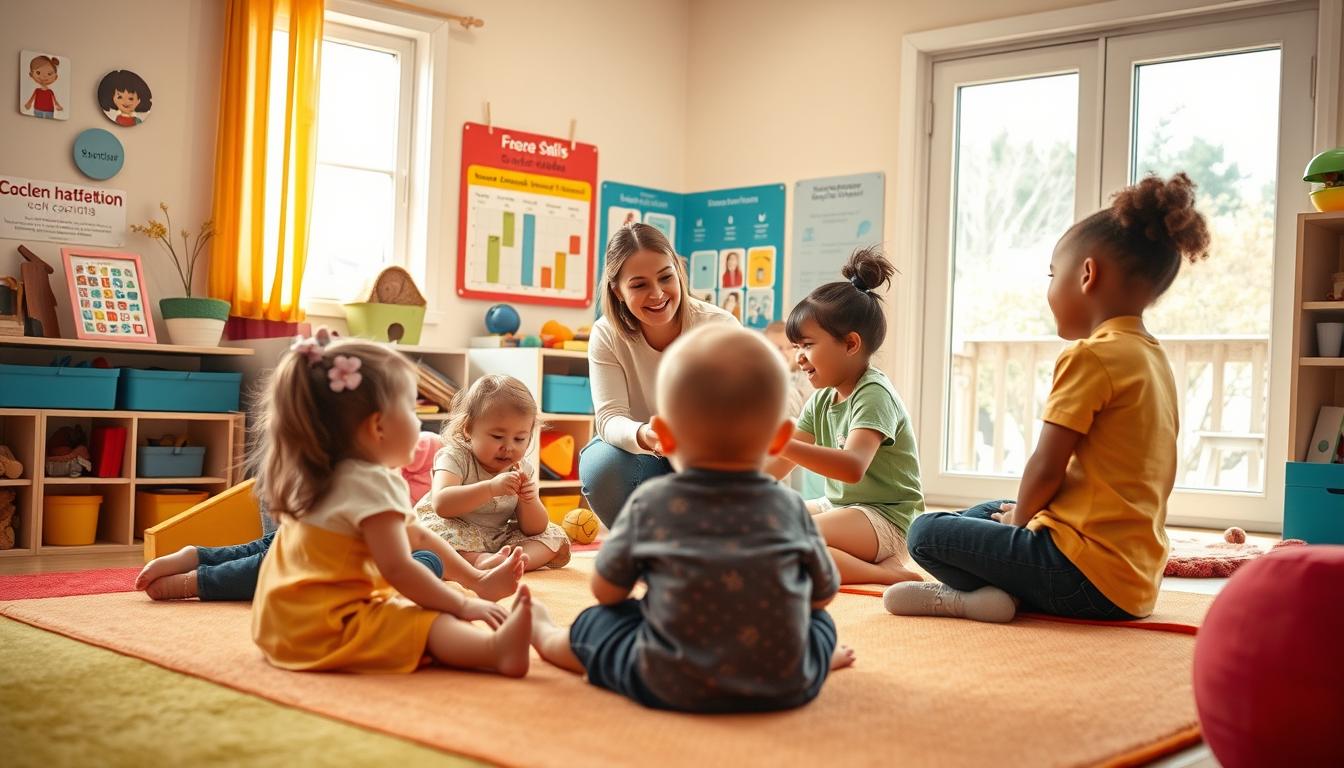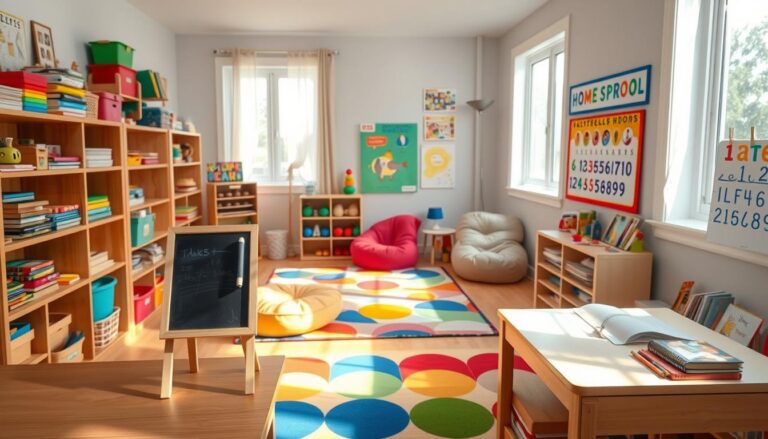Teaching Social Skills in Home Pre-School
Have you ever wondered how early experiences shape a child’s ability to connect with others? The foundation of effective communication and emotional growth begins at home, and we’re here to guide you through it.
In today’s world, helping your child learn essential skills like sharing, cooperation, and empathy is more important than ever. These abilities not only prepare them for school but also set the stage for lifelong success.
We’ll explore practical ways to nurture these skills in a home setting. From play-based activities to fostering friendships, our guide offers research-backed strategies that parents can easily implement. Let’s create meaningful opportunities for your child’s growth together.
Understanding the Foundations of Preschool Social Development
The early years of a child’s life are crucial for building meaningful connections. These interactions lay the groundwork for emotional resilience and cognitive growth. Research shows that children who engage in positive exchanges during this period are better equipped to handle challenges later in life.
The Role of Early Social Interaction in Building Relationships
From a young age, children learn to navigate relationships through simple activities like sharing toys or taking turns. These experiences teach them the value of cooperation and empathy. Structured group games, for instance, help them understand different perspectives and resolve conflicts effectively.
Communication plays a vital role in forming bonds. Whether it’s through verbal exchanges or non-verbal cues, children begin to express their ideas and emotions. This foundation is essential for fostering healthy peer relationships and preparing them for future academic success.
How Social Skills Shape Emotional and Cognitive Growth
Developing social skills is not just about making friends; it’s about building emotional intelligence. Activities that encourage turn-taking and teamwork, for example, enhance problem-solving abilities and cognitive development. These skills are critical for achieving both personal and academic goals.
Empathy and conflict resolution are equally important. When children learn to understand others’ feelings and resolve disputes, they gain confidence and resilience. These abilities are nurtured through age-appropriate games and interactive play, which are key to their overall growth.
| Aspect | Impact |
|---|---|
| Interaction | Builds communication and cooperation skills |
| Empathy | Enhances emotional understanding |
| Conflict Resolution | Promotes problem-solving and resilience |
| Group Games | Encourages teamwork and perspective-taking |
Strategies for Teaching Social Skills in a Home Preschool Setting
Building strong connections starts with simple, everyday actions at home. Parents can play a key role in helping their child learn essential skills like communication, cooperation, and empathy. These abilities are not only vital for school readiness but also for lifelong success.
We’ll explore practical strategies that parents can easily implement. From active play to fostering teamwork, these methods are designed to create meaningful opportunities for growth. Let’s dive into actionable steps that make a difference.
Encouraging Communication and Active Play at Home
Active play is a powerful tool for teaching social skills. Games that involve turn-taking or role-playing, for example, help children practice communication and teamwork. These activities also provide a safe space for expressing emotions and resolving conflicts.
Parents can set up play sessions that encourage interaction. Simple tasks like building blocks or solving puzzles together promote cooperation. These moments not only strengthen bonds but also help young children learn the value of teamwork.
Fostering Empathy, Cooperation, and Conflict Resolution
Empathy is a cornerstone of healthy relationships. Parents can model this skill by acknowledging their child’s feelings and discussing emotions openly. Reading stories that highlight kindness and understanding is another effective way to teach empathy.
Cooperation can be nurtured through group activities. For instance, cooking together or creating art projects encourages teamwork. These experiences teach children to share, compromise, and work toward a common goal.
Conflict resolution is equally important. Parents can guide their child through disagreements by teaching them to listen and negotiate. These skills are essential for building resilience and confidence in social settings.
- Use role-playing games to practice communication and problem-solving.
- Incorporate reading into daily routines to teach empathy and language skills.
- Set up cooperative tasks like building projects or group art activities.
- Discuss emotions openly to help children understand and manage their feelings.
- Encourage turn-taking and sharing during playtime to foster teamwork.
For more insights on fostering social growth, explore our home preschool program. These strategies are designed to help your child thrive in all aspects of life.
Engaging Activities to Enhance Social Interaction
What if everyday activities could transform how your child interacts with others? Simple, creative tasks can help build essential skills like teamwork, communication, and emotional awareness. These activities are not only fun but also prepare your child for future challenges.
Interactive Roleplaying and Group-based Games
Roleplaying games allow children to explore different roles in a safe environment. For example, pretending to be a teacher or a doctor helps them understand others’ perspectives. This activity enhances communication and problem-solving abilities.
Group games like scavenger hunts or building projects encourage teamwork. These tasks teach children to share ideas, take turns, and work toward a common goal. Such interactions foster a sense of belonging and cooperation.
Creative Arts, Storytelling, and Practical Life Exercises
Creative arts, such as drawing or crafting, provide a platform for emotional expression. These activities help children share their feelings and ideas with peers. Storytelling sessions, on the other hand, build language skills and empathy.
Practical life exercises, like cooking or gardening, integrate everyday tasks with skill-building. These activities teach responsibility and teamwork while making learning meaningful. Parents can easily adapt these tasks to suit their child’s needs.
- Use roleplaying to practice communication and explore different roles.
- Organize group games to encourage teamwork and problem-solving.
- Incorporate creative arts to help children express emotions.
- Introduce storytelling to build language skills and empathy.
- Engage in practical life exercises to teach responsibility and cooperation.
By incorporating these activities into daily routines, parents can create a balanced schedule that includes both structured and free play. This approach ensures every child benefits from meaningful interactions and grows confidently.
Benefits of Preschool Social Development for Your Child
Why is early interaction so vital for a child’s growth and future success? Studies show that the foundation built during these formative years shapes their ability to communicate, solve problems, and form meaningful relationships. By focusing on these skills, we can help children thrive in all aspects of life.
Building Language Skills, Confidence, and Emotional Resilience
Early interaction plays a key role in language development. Children exposed to diverse vocabulary during play show a 30% increase in language skills. This not only enhances communication but also boosts their confidence in expressing ideas.
Emotional resilience is another critical benefit. Activities like role-playing help children understand and manage their feelings. Research indicates that such activities improve empathetic responses by 40%, fostering healthier relationships.
Long-term Advantages in Academic Success and Social Integration
Strong interaction skills are closely linked to academic performance. Children who engage in cooperative play demonstrate a 25% higher ability to resolve conflicts effectively. This skill is essential for navigating challenges in school and beyond.
Moreover, early experiences in group activities prepare children for long-term success. Studies show that these interactions enhance critical thinking and teamwork, setting the stage for future career achievements.
- Encourage play-based learning to boost language and communication skills.
- Use role-playing activities to teach empathy and emotional understanding.
- Promote group tasks to foster teamwork and conflict resolution.
- Create opportunities for collaborative learning to enhance academic readiness.
By focusing on these strategies, we can ensure that every child benefits from meaningful interactions and grows confidently. Let’s work together to create a brighter future for our children.
Conclusion
Nurturing essential skills at home lays the groundwork for a child’s future success. By integrating activities like role-playing and group games, parents can foster teamwork and emotional understanding. These moments not only build confidence but also prepare children for academic and personal growth.
Effective strategies, such as encouraging communication and resolving conflicts, create a supportive environment. Every turn, every shared moment, helps children learn the value of cooperation and empathy. These experiences shape their ability to connect with others in meaningful ways.
We encourage parents to adopt these techniques and adapt them to their routines. Together, we can help children thrive, building a foundation for lifelong success. Let’s take confident steps to enhance their learning journey today.







